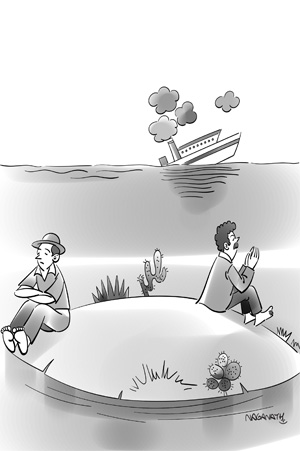 A voyaging ship was wrecked during a storm at sea and only two of the men on it were able to swim to a small, desert like island. The two survivors who have been good friends, not knowing what else to do, agreed that they had no other recourse but to pray to God. However, to find out whose prayer was more powerful, they agreed to divide the territory between them and stay on opposite sides of the island. The first thing they prayed for was food. The next morning, the first man saw a fruit-bearing tree on his side of the land, and he was able to eat its fruit. The other man’s parcel of land remained barren. After a week, the first man was lonely and he decided to pray for a wife. The next day, another ship was wrecked, and the only survivor was a woman who swam to his side of the land. On the other side of the island, there was nothing. Soon the first man prayed for a house, clothes, more food. The next day, like magic, all of these were given to him. However, the second man still had nothing. Finally, the first man prayed for a ship, so that he and his wife could leave the island. In the morning, he found a ship docked at his side of the island. The first man boarded the ship with his wife and decided to leave the second man on the island. He considered the other man unworthy to receive God’s blessings since none of his prayers had been answered. As the ship was about to leave, the first man heard a voice from heaven booming, “Why are you leaving your companion on the island?” “My blessings are mine alone since I was the one who prayed for them,” the first man answered. “His prayers were all unanswered and so he does not deserve anything.” “You are mistaken!” the voice rebuked him. “He had only one prayer, which I answered. If not for that, you would not have received any of my blessings.” “Tell me,” the first man asked the voice, “What did he pray for that I should owe him anything?” “He prayed that all your prayers be answered ” Moral: For all we know, our blessings are not the fruits of our prayers alone, but those of another praying for us (Congregational Prayer). Value your friends, don’t leave your loved ones behind.
A voyaging ship was wrecked during a storm at sea and only two of the men on it were able to swim to a small, desert like island. The two survivors who have been good friends, not knowing what else to do, agreed that they had no other recourse but to pray to God. However, to find out whose prayer was more powerful, they agreed to divide the territory between them and stay on opposite sides of the island. The first thing they prayed for was food. The next morning, the first man saw a fruit-bearing tree on his side of the land, and he was able to eat its fruit. The other man’s parcel of land remained barren. After a week, the first man was lonely and he decided to pray for a wife. The next day, another ship was wrecked, and the only survivor was a woman who swam to his side of the land. On the other side of the island, there was nothing. Soon the first man prayed for a house, clothes, more food. The next day, like magic, all of these were given to him. However, the second man still had nothing. Finally, the first man prayed for a ship, so that he and his wife could leave the island. In the morning, he found a ship docked at his side of the island. The first man boarded the ship with his wife and decided to leave the second man on the island. He considered the other man unworthy to receive God’s blessings since none of his prayers had been answered. As the ship was about to leave, the first man heard a voice from heaven booming, “Why are you leaving your companion on the island?” “My blessings are mine alone since I was the one who prayed for them,” the first man answered. “His prayers were all unanswered and so he does not deserve anything.” “You are mistaken!” the voice rebuked him. “He had only one prayer, which I answered. If not for that, you would not have received any of my blessings.” “Tell me,” the first man asked the voice, “What did he pray for that I should owe him anything?” “He prayed that all your prayers be answered ” Moral: For all we know, our blessings are not the fruits of our prayers alone, but those of another praying for us (Congregational Prayer). Value your friends, don’t leave your loved ones behind.
Author: admin
Problem Solution
 A father was engrossed in his work while his little daughter constantly distracted
A father was engrossed in his work while his little daughter constantly distracted
him in an attempt for him to make him play with her. To keep her busy, the man
tore a page of printed map of the world from a magazine into pieces and asked
her to go to her room and put them together to make the map again. The daughter
was very young and he was pretty sure that she would take hours to get it done.
The father was surprised when he saw his little one coming out of the room with a
smile and the perfect map within a few minutes. The stunned man asked his
daughter how she could solve the puzzle so quickly.
“Daddy, there is a woman’s face on the other side of the paper, When I made the
face perfect, I got the map right.” replied the young girl.
Moral: There is always the other side to whatever you experience in this world.
Whenever we come across a challenge or a puzzling situation, look at the other
side. You will be surprised to see different approaches to tackle the problem
Greedy
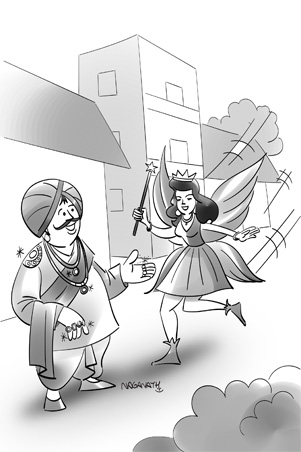 Once there lived a greedy man in a small town. He was very rich, and he loved
Once there lived a greedy man in a small town. He was very rich, and he loved
gold and all things fancy. But he loved his daughter more than anything. One day,
he chanced upon a fairy. The fairy’s hair was caught in a few tree branches. He
helped her out, but as his greediness took over, he realised that he had an
opportunity to become richer by asking for a wish in return (by helping her out).
The fairy granted him a wish. He said, “All that I touch should turn to gold.” And his
wish was granted by the grateful fairy.
The greedy man rushed home to tell his wife and daughter about his wish, all the
while touching stones and pebbles and watching them convert into gold. Once he
got home, his daughter rushed to greet him. As soon as he bent down to scoop
her up in his arms, she turned into a gold statue. He started crying and trying to
bring his daughter back to life. He realized his folly and spent the rest of his days
searching for the fairy to take away his wish.
Moral of the Story
Greed will always lead to downfall.
Decision Story
 Decision StoryA washer man was taking his old donkey to the market with his son riding the
Decision StoryA washer man was taking his old donkey to the market with his son riding the
donkey. Some people who saw this, said, “What a son that makes his old father
walk”.
The son felt bad, got down and decided to let his father ride the donkey. Some
people who saw this, said, “What a set of foolish father and son. They have a
donkey and yet one of them is walking”.
Now based on this input, the father and the son made their second decision and
both of them started riding the donkey together. Some people who saw this, said,
“What a merciless pitiable act. Two people riding on a poor old donkey?”
Based on the new remarks the father and son did analysis of the situation and
took yet another decision. They both got down and carried the donkey all the way.
They were too tired by the time they reached the market, tripped over a stone and
fell down injuring themselves and killing the donkey they brought this far to sell.
Moral of this story
“What people think is their problem. Make decisions based on what you
think.”
99 Club
 Once upon a time, there lived a King who, despite his luxurious lifestyle, was neither happy nor content. One day, the King came upon a servant who was singing happily while he worked. This fascinated the King, why was he, the Supreme Ruler of the Land, unhappy and gloomy, while a lowly servant had so much joy. The King asked the servant, “Why are you so happy?” The man replied, “Your Majesty, I am nothing but a servant, but my family and I don’t need too much, just a roof over our heads and warm food to fill our tummies.” The king was not satisfied with that reply. Later in the day, he sought the advice of his most trusted advisor. After hearing the King’s woes and the servant’s story, the advisor said, “Your Majesty, I believe that the servant has not been made part of The 99 Club.” “The 99 Club? And what exactly is that?” the King inquired. The advisor replied, “Your Majesty, to truly know what The 99 Club is, place 99 Gold coins in a bag and leave it at this servant’s doorstep.” So the King ordered to do it. When the servant saw the bag, he took it into his house. When he opened the bag, he let out a great shout of joy, So many gold coins! He began to count them. After several counts, he was at last convinced that there were 99 coins. He wondered, “What could’ve happened to that last gold coin? Surely, no one would leave 99 coins!” He looked everywhere he could, but that final coin was elusive. Finally, exhausted, he decided that he was going to have to work harder than ever to earn that gold coin and complete his collection. From that day, the servant’s life was changed. He was overworked, horribly grumpy, and castigated his family for not helping him make that 100th gold coin. He stopped singing while he worked. Witnessing this drastic transformation, the King was puzzled. When he sought his advisor’s help, the advisor said, “Your Majesty, the servant has now officially joined The 99 Club.” He continued, “The 99 Club is a name given to those people who have enough to be happy but are never content, because they’re always yearning and striving for that extra 1 telling to themselves, “Let me get that one final thing and then I will be happy for life.” Moral: We can be happy, even with very little in our lives, but the minute we’re given something bigger and better, we want even more! We lose our sleep, our happiness, we hurt the people around us, all these as a price for our growing needs and desires. We must learn to maintain a balance of our need and desires to enjoy a happy life with what we already have.
Once upon a time, there lived a King who, despite his luxurious lifestyle, was neither happy nor content. One day, the King came upon a servant who was singing happily while he worked. This fascinated the King, why was he, the Supreme Ruler of the Land, unhappy and gloomy, while a lowly servant had so much joy. The King asked the servant, “Why are you so happy?” The man replied, “Your Majesty, I am nothing but a servant, but my family and I don’t need too much, just a roof over our heads and warm food to fill our tummies.” The king was not satisfied with that reply. Later in the day, he sought the advice of his most trusted advisor. After hearing the King’s woes and the servant’s story, the advisor said, “Your Majesty, I believe that the servant has not been made part of The 99 Club.” “The 99 Club? And what exactly is that?” the King inquired. The advisor replied, “Your Majesty, to truly know what The 99 Club is, place 99 Gold coins in a bag and leave it at this servant’s doorstep.” So the King ordered to do it. When the servant saw the bag, he took it into his house. When he opened the bag, he let out a great shout of joy, So many gold coins! He began to count them. After several counts, he was at last convinced that there were 99 coins. He wondered, “What could’ve happened to that last gold coin? Surely, no one would leave 99 coins!” He looked everywhere he could, but that final coin was elusive. Finally, exhausted, he decided that he was going to have to work harder than ever to earn that gold coin and complete his collection. From that day, the servant’s life was changed. He was overworked, horribly grumpy, and castigated his family for not helping him make that 100th gold coin. He stopped singing while he worked. Witnessing this drastic transformation, the King was puzzled. When he sought his advisor’s help, the advisor said, “Your Majesty, the servant has now officially joined The 99 Club.” He continued, “The 99 Club is a name given to those people who have enough to be happy but are never content, because they’re always yearning and striving for that extra 1 telling to themselves, “Let me get that one final thing and then I will be happy for life.” Moral: We can be happy, even with very little in our lives, but the minute we’re given something bigger and better, we want even more! We lose our sleep, our happiness, we hurt the people around us, all these as a price for our growing needs and desires. We must learn to maintain a balance of our need and desires to enjoy a happy life with what we already have.
Positive
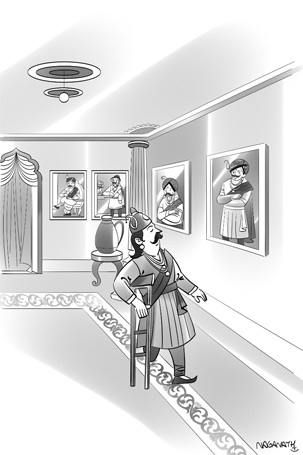 Once upon a time, there was a Kingdom. The king there only had one leg and one eye, but he was very intelligent and kind. Everyone in his kingdom lived a happy and a healthy life because of their king. One day the king was walking through the palace hallway and saw the portraits of his ancestors. He thought that one day his children will walk in the same hallway and remember all the ancestors through these portraits. But, the king did not have his portrait painted. Due to his physical disabilities, he wasn’t sure how his painting would turn out. So he invited many famous painters from his and other kingdoms to the court. The king then announced that he wants a beautiful portrait made of himself to be placed in the palace. Any painter who can carry out this should come forward. He will be rewarded based on how the painting turns up. All of the painters began to think that the king only has one leg and one eye. How can his picture be made very beautiful? It is not possible and if the picture does not turn out to look beautiful then the king will get angry and punish them. So one by one, all started to make excuses and politely declined to make a painting of the king. But suddenly one painter raised his hand and said that I will make a very beautiful portrait of you which you will surely like. The king became happy hearing that and other painters got curious. The king gave him the permission and the painter started drawing the portrait. He then filled the drawing with paints. Finally, after taking a long time, he said that the portrait was ready! All of the courtiers, other painters were curious and nervous thinking, How can the painter make the king’s portrait beautiful because the king is physically disabled? What if the king didn’t like the painting and gets angry? But when the painter presented the portrait, everyone in the court, including the king, left stunned. The painter made a portrait in which the king was sitting on the horse, on the one-leg side, holding his bow and aiming the arrow with his one eye closed. The king was very pleased to see that the painter has made a beautiful portrait by cleverly hiding the king’s disabilities. The King gave him a great reward. Moral: We should always think positive of others and ignore their deficiencies. We should learn to focus on the good things instead of trying to hide weaknesses. If we think and approach positively even in a negative situation, then we will be able to solve our problems more efficiently.
Once upon a time, there was a Kingdom. The king there only had one leg and one eye, but he was very intelligent and kind. Everyone in his kingdom lived a happy and a healthy life because of their king. One day the king was walking through the palace hallway and saw the portraits of his ancestors. He thought that one day his children will walk in the same hallway and remember all the ancestors through these portraits. But, the king did not have his portrait painted. Due to his physical disabilities, he wasn’t sure how his painting would turn out. So he invited many famous painters from his and other kingdoms to the court. The king then announced that he wants a beautiful portrait made of himself to be placed in the palace. Any painter who can carry out this should come forward. He will be rewarded based on how the painting turns up. All of the painters began to think that the king only has one leg and one eye. How can his picture be made very beautiful? It is not possible and if the picture does not turn out to look beautiful then the king will get angry and punish them. So one by one, all started to make excuses and politely declined to make a painting of the king. But suddenly one painter raised his hand and said that I will make a very beautiful portrait of you which you will surely like. The king became happy hearing that and other painters got curious. The king gave him the permission and the painter started drawing the portrait. He then filled the drawing with paints. Finally, after taking a long time, he said that the portrait was ready! All of the courtiers, other painters were curious and nervous thinking, How can the painter make the king’s portrait beautiful because the king is physically disabled? What if the king didn’t like the painting and gets angry? But when the painter presented the portrait, everyone in the court, including the king, left stunned. The painter made a portrait in which the king was sitting on the horse, on the one-leg side, holding his bow and aiming the arrow with his one eye closed. The king was very pleased to see that the painter has made a beautiful portrait by cleverly hiding the king’s disabilities. The King gave him a great reward. Moral: We should always think positive of others and ignore their deficiencies. We should learn to focus on the good things instead of trying to hide weaknesses. If we think and approach positively even in a negative situation, then we will be able to solve our problems more efficiently.
Panctuality
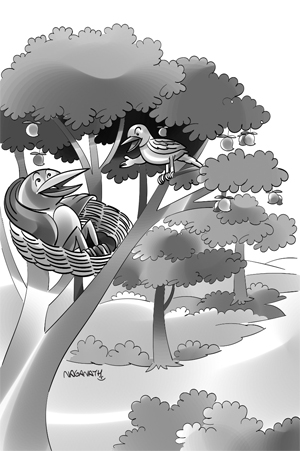 Once there was a bird called “Tailor” who lived on a big mango tree. “Tailor” was a busy little bird who took good care of his family. He was always moving in and out of his cozy little nest looking for insects to feed his little ones or collecting grass to strengthen his nest from the approaching winter. In the same tree, there was a crow called “Crook” who was very lazy and spent all his time sleeping or gossiping with the other birds in the neighborhood. Many times Tailor advises Crook, “Please repair your nest. The monsoon is soon approaching and the heavy winds could blow it away”. “Crook” would say “You worry too much Tailor”. You must learn to enjoy life. I can get it done immediately. After all, it is a small hole. As the days went by, the hole in “Crook’s” nest grew bigger and bigger and it was in danger of falling apart. One day there was heavy thunder and lightning and it started raining. It was then that “Crook” realized that his family was in great danger. “Crook” flew from tree to tree looking for twigs and tiny sticks to repair his nest, while “Tailor” sat comfortably in his nest. He flew here and there to save his home and almost collapsed in exhaustion. Finally, “Tailor” also gave a helping hand and helped “Crook” rebuild his nest. “Crook” realized his foolishness and promised-never again postpone any work that required immediate attention. Thereafter, the crow “Crook” did all those things which required immediate attention and action. Both “Tailor and Crook” lived happily as friends.
Once there was a bird called “Tailor” who lived on a big mango tree. “Tailor” was a busy little bird who took good care of his family. He was always moving in and out of his cozy little nest looking for insects to feed his little ones or collecting grass to strengthen his nest from the approaching winter. In the same tree, there was a crow called “Crook” who was very lazy and spent all his time sleeping or gossiping with the other birds in the neighborhood. Many times Tailor advises Crook, “Please repair your nest. The monsoon is soon approaching and the heavy winds could blow it away”. “Crook” would say “You worry too much Tailor”. You must learn to enjoy life. I can get it done immediately. After all, it is a small hole. As the days went by, the hole in “Crook’s” nest grew bigger and bigger and it was in danger of falling apart. One day there was heavy thunder and lightning and it started raining. It was then that “Crook” realized that his family was in great danger. “Crook” flew from tree to tree looking for twigs and tiny sticks to repair his nest, while “Tailor” sat comfortably in his nest. He flew here and there to save his home and almost collapsed in exhaustion. Finally, “Tailor” also gave a helping hand and helped “Crook” rebuild his nest. “Crook” realized his foolishness and promised-never again postpone any work that required immediate attention. Thereafter, the crow “Crook” did all those things which required immediate attention and action. Both “Tailor and Crook” lived happily as friends.
Cleaning Turtles(Helping People)
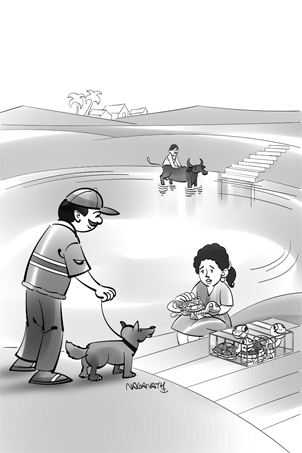 There was once a man who walked his dog every Sunday morning around a lake near his house. Week after week, he saw the same elderly woman sitting at the edge of the water with a small metal cage next to her. The man’s curiosity finally got the best of him and he approached the woman one day. He noticed that the cage was actually a small trap and she had three small turtles in it. In her lap, there was a fourth turtle that she was carefully wiping down with a sponge. The man greeted her and said, “If you don’t mind my asking, what do you do with these turtles every week?” She smiled and explained to him that she was cleaning their shells because any algae or scum that builds up on a turtle’s shell reduces its ability to absorb heat and slows down their swimming. It can also corrode their shell and weaken it over time. The man was impressed as the woman continued, “I do this every Sunday morning to help the turtles.” “But don’t most turtles live their entire lives with algae on their shells?” the man asked. The woman agreed that was true. He replied, “Well then, you’re kind to do this, but are you really making a difference if most turtles don’t have people around to clean their shells?” The woman laughed as she looked down at the small turtle on her lap. “Young man, if this little turtle could talk, he would say I’m making all the difference in the world.’” The Moral: “To the world you may be one person; but to one person you may be the world.” — Dr. Seuss Just because you may not be able to change the world or help everyone, you can still make a huge difference in one person’s life by offering them any help that you can. Don’t choose to not do anything because you can’t do everything. The actions of one person can make a world of difference to someone else. When you see someone in need, you may never know how much of a difference your help can make in their life.
There was once a man who walked his dog every Sunday morning around a lake near his house. Week after week, he saw the same elderly woman sitting at the edge of the water with a small metal cage next to her. The man’s curiosity finally got the best of him and he approached the woman one day. He noticed that the cage was actually a small trap and she had three small turtles in it. In her lap, there was a fourth turtle that she was carefully wiping down with a sponge. The man greeted her and said, “If you don’t mind my asking, what do you do with these turtles every week?” She smiled and explained to him that she was cleaning their shells because any algae or scum that builds up on a turtle’s shell reduces its ability to absorb heat and slows down their swimming. It can also corrode their shell and weaken it over time. The man was impressed as the woman continued, “I do this every Sunday morning to help the turtles.” “But don’t most turtles live their entire lives with algae on their shells?” the man asked. The woman agreed that was true. He replied, “Well then, you’re kind to do this, but are you really making a difference if most turtles don’t have people around to clean their shells?” The woman laughed as she looked down at the small turtle on her lap. “Young man, if this little turtle could talk, he would say I’m making all the difference in the world.’” The Moral: “To the world you may be one person; but to one person you may be the world.” — Dr. Seuss Just because you may not be able to change the world or help everyone, you can still make a huge difference in one person’s life by offering them any help that you can. Don’t choose to not do anything because you can’t do everything. The actions of one person can make a world of difference to someone else. When you see someone in need, you may never know how much of a difference your help can make in their life.
Time Management
 A consultant was hired to help a team of high-achieving executives develop more work-life balance. He brought in a one-gallon glass jar and filled it with large stones. He asked the group if the jar was full. The group agreed that the jar was pretty full.Focus on the big things However, he pulled out a bag of smaller pebbles like you would see in a fish tank, and poured them in as well. As he shook the jar, the smaller pebbles fell into the spaces between the large rocks. Again he asked, “So, is the jar full?” The group was more hesitant, now, though. So, they waited to see what he would pull out next. Not to disappoint, he pulled out a bag of sand, and poured it into the jar as well. “Now is the jar full?” One of the high-achievers in the front row, learning his game said, “No, you can still pour water into the jar.” Of course, he did. The same woman in the front row then said, “I get it. The point is that no matter how busy our schedule is, you can always cram something else in, right?” The consultant smiled at her and said, “Not exactly. My point is that the big items only fit into the jar at all because we put them in first. If you don’t focus on the big things like, spending time with your family and having a strong spiritual life, the little things will always seep in and take up all the space.” Use the Rocks in a Jar Time Management parable to encourage people to focus on the most important things in life.
A consultant was hired to help a team of high-achieving executives develop more work-life balance. He brought in a one-gallon glass jar and filled it with large stones. He asked the group if the jar was full. The group agreed that the jar was pretty full.Focus on the big things However, he pulled out a bag of smaller pebbles like you would see in a fish tank, and poured them in as well. As he shook the jar, the smaller pebbles fell into the spaces between the large rocks. Again he asked, “So, is the jar full?” The group was more hesitant, now, though. So, they waited to see what he would pull out next. Not to disappoint, he pulled out a bag of sand, and poured it into the jar as well. “Now is the jar full?” One of the high-achievers in the front row, learning his game said, “No, you can still pour water into the jar.” Of course, he did. The same woman in the front row then said, “I get it. The point is that no matter how busy our schedule is, you can always cram something else in, right?” The consultant smiled at her and said, “Not exactly. My point is that the big items only fit into the jar at all because we put them in first. If you don’t focus on the big things like, spending time with your family and having a strong spiritual life, the little things will always seep in and take up all the space.” Use the Rocks in a Jar Time Management parable to encourage people to focus on the most important things in life.
Saying No
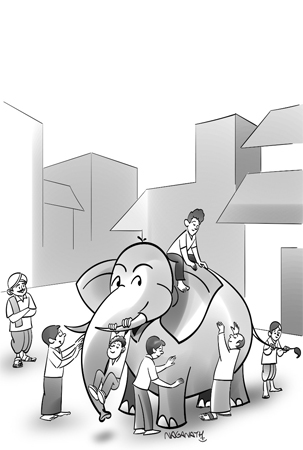 Once upon a time, a number of disciples went to Buddha and said, “Sir, there are living here in Savatthi many wandering hermits and scholars who indulge constant dispute, some saying that the world is infinite and eternal and others that it is limited and not eternal, some saying that the soul dies with the body and others that it lives on forever, and so forth. What, sir, would you say concerning them?” And the Buddha answers: “Once upon a time, there was a certain raja who called to his servant and said, ‘Come, good fellow, go and gather together in one place all the men of savatthi who were born blind. And show them an elephant.” “Very good, sir,’ replied the servant, and he did as he was told. He said to the blind men assembled there, ‘here is an elephant,’ and to one man he presented the head of the elephant, and to others it’s ears, and to another task, and to another the trunk, the foot, the back, the tail, and tuft of the tail, saying to each on that that was the elephant. “When the blind man felt the elephant, the raja went to each of them and set to each, ‘well, blind man, have you seen the elephant? Tell me, what sort of thing is an elephant?” Thereupon the man who was presented with the head answered, ‘sire, the elephant is like a pot.’ and the man who had observed the ear replied, ‘An elephant is like a winnowing basket.’ Those who had been presented with a tusk said, ‘sire it is like a plow!’ others said the body was a grainery; the foot, a pillar, the back, a mortar; the tail, a pestle, the tuft of the tail, a brush. “Then they begin to quarrel, shouting ‘yes it is! ‘no, it isn’t!’ ‘An elephant is not that!’ ‘yes, it’s like that!’ and so on, till they came to blows over the matter. “Brethren, the raja was delighted with the scene.” Just so are these preachers and scholars holding various views blind and unseeing, In their ignorance, they are by nature quarrelsome, wrangling, and disputatious, each maintaining reality is thus and thus.” Then Buddha rendered these meanings by uttering this verse of uplift: “o how they cling wrangle, some who claim For preacher and monk the honored name. for, quarreling, each to his view they cling. Such folk see only one side of a thing” You see in life, everyone sees this world through his own eyes hears the world through is own ears smells the worlds through his own nose, and feels the world through his own skin, each to his own we mustn’t quarrel about the definition and whatnot, because the sake of an argument, is not the argument but the enlightenment. So say no to those who just come for a quarrel, say no to those who don’t want to understand that each has his own different view. And respect that.
Once upon a time, a number of disciples went to Buddha and said, “Sir, there are living here in Savatthi many wandering hermits and scholars who indulge constant dispute, some saying that the world is infinite and eternal and others that it is limited and not eternal, some saying that the soul dies with the body and others that it lives on forever, and so forth. What, sir, would you say concerning them?” And the Buddha answers: “Once upon a time, there was a certain raja who called to his servant and said, ‘Come, good fellow, go and gather together in one place all the men of savatthi who were born blind. And show them an elephant.” “Very good, sir,’ replied the servant, and he did as he was told. He said to the blind men assembled there, ‘here is an elephant,’ and to one man he presented the head of the elephant, and to others it’s ears, and to another task, and to another the trunk, the foot, the back, the tail, and tuft of the tail, saying to each on that that was the elephant. “When the blind man felt the elephant, the raja went to each of them and set to each, ‘well, blind man, have you seen the elephant? Tell me, what sort of thing is an elephant?” Thereupon the man who was presented with the head answered, ‘sire, the elephant is like a pot.’ and the man who had observed the ear replied, ‘An elephant is like a winnowing basket.’ Those who had been presented with a tusk said, ‘sire it is like a plow!’ others said the body was a grainery; the foot, a pillar, the back, a mortar; the tail, a pestle, the tuft of the tail, a brush. “Then they begin to quarrel, shouting ‘yes it is! ‘no, it isn’t!’ ‘An elephant is not that!’ ‘yes, it’s like that!’ and so on, till they came to blows over the matter. “Brethren, the raja was delighted with the scene.” Just so are these preachers and scholars holding various views blind and unseeing, In their ignorance, they are by nature quarrelsome, wrangling, and disputatious, each maintaining reality is thus and thus.” Then Buddha rendered these meanings by uttering this verse of uplift: “o how they cling wrangle, some who claim For preacher and monk the honored name. for, quarreling, each to his view they cling. Such folk see only one side of a thing” You see in life, everyone sees this world through his own eyes hears the world through is own ears smells the worlds through his own nose, and feels the world through his own skin, each to his own we mustn’t quarrel about the definition and whatnot, because the sake of an argument, is not the argument but the enlightenment. So say no to those who just come for a quarrel, say no to those who don’t want to understand that each has his own different view. And respect that.
